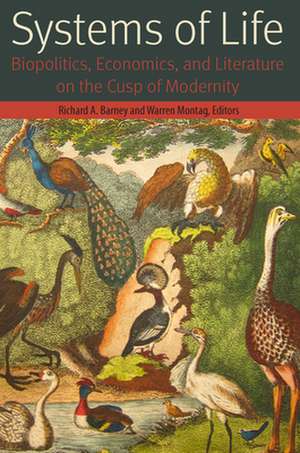Systems of Life – Biopolitics, Economics, and Literature on the Cusp of Modernity: Forms of Living
Autor Richard A. Barney, Warren Montag, Timothy C. Campbell, Mrinalini Chakravorty, James Edward Forden Limba Engleză Paperback – 5 noi 2018
This collection of essays takes its cue from the ascendency of system indicated by Smith's work in order to articulate a framework in which to grasp the complex relations among biological knowledge, economics, and politics in Europe and its colonies from the mid-eighteenth to the mid-nineteenth century. In these terms, this volume aims to draw on recent scholarly accounts of the significance of "system" in Renaissance and Enlightenment contexts in order to revaluate the importance of the systematic to biopolitical theory, which has paid particular attention to the importance of this historical period, especially in the case analysts such as Michel Foucault, Giorgio Agamben, and Roberto Esposito. Taken as a whole, the essays in this volume can therefore be taken as an argument that the concept of "system" can help specify all the more concretely the ways that the "bio" was articulated in relation to the "political" in late eighteenth- and early nineteenth-century biopolitics, with "economy" serving as a useful mediating term between them by offering a way to articulate their "order" as a matter of exchange, valuation, or management. Given Smith's remark about the "beauty" of systems, moreover, it is no accident that several of the essays in this volume examine the relevance of aesthetic production--whether poetry, fiction, comedy, or visual art--to the deployment of economic values in relation to both biological and political spheres.
Din seria Forms of Living
-
 Preț: 280.65 lei
Preț: 280.65 lei -
 Preț: 192.74 lei
Preț: 192.74 lei -
 Preț: 216.79 lei
Preț: 216.79 lei -
 Preț: 110.31 lei
Preț: 110.31 lei -
 Preț: 258.85 lei
Preț: 258.85 lei -
 Preț: 308.72 lei
Preț: 308.72 lei - 19%
 Preț: 477.19 lei
Preț: 477.19 lei -
 Preț: 203.95 lei
Preț: 203.95 lei - 19%
 Preț: 528.54 lei
Preț: 528.54 lei - 19%
 Preț: 556.92 lei
Preț: 556.92 lei - 19%
 Preț: 452.39 lei
Preț: 452.39 lei -
 Preț: 221.57 lei
Preț: 221.57 lei - 19%
 Preț: 502.49 lei
Preț: 502.49 lei - 19%
 Preț: 444.92 lei
Preț: 444.92 lei -
 Preț: 182.66 lei
Preț: 182.66 lei - 19%
 Preț: 563.15 lei
Preț: 563.15 lei -
 Preț: 245.75 lei
Preț: 245.75 lei -
 Preț: 301.09 lei
Preț: 301.09 lei -
 Preț: 192.27 lei
Preț: 192.27 lei -
 Preț: 387.56 lei
Preț: 387.56 lei -
 Preț: 261.07 lei
Preț: 261.07 lei - 24%
 Preț: 699.01 lei
Preț: 699.01 lei
Preț: 335.17 lei
Nou
Puncte Express: 503
Preț estimativ în valută:
64.14€ • 66.72$ • 52.95£
64.14€ • 66.72$ • 52.95£
Carte indisponibilă temporar
Doresc să fiu notificat când acest titlu va fi disponibil:
Se trimite...
Preluare comenzi: 021 569.72.76
Specificații
ISBN-13: 9780823281718
ISBN-10: 082328171X
Pagini: 280
Dimensiuni: 152 x 228 x 20 mm
Greutate: 0.41 kg
Editura: Wiley
Seria Forms of Living
ISBN-10: 082328171X
Pagini: 280
Dimensiuni: 152 x 228 x 20 mm
Greutate: 0.41 kg
Editura: Wiley
Seria Forms of Living
Cuprins
Notă biografică
Richard A. Barney (Edited By)
Richard A. Barney is an associate professor of English at the University at Albany, SUNY. He is the author of Plots of Enlightenment: Education and the Novel in Eighteenth-Century England (Stanford University Press, 1999) and has edited several volumes, including Rhetorics of Plague, Early and Late for the Journal for Early Modern Cultural Studies (Winter 2010¿11). He is currently at work on a book about the biopolitics of the sublime in eighteenth-century Britain.
Warren Montag (Edited By)
Warren Montag is the Brown Family Professor of Literature at Occidental College in Los Angeles. His most recent books include Althusser and His Contemporaries (Duke University Press, 2013) and The Other Adam Smith (Stanford University Press, 2014). He is also the editor of Décalages, a journal on Althusser and his circle, and the translator of Etienne Balibar¿s Identity and Difference: John Locke and the Invention of Consciousness (Verso, 2013).
Richard A. Barney is an associate professor of English at the University at Albany, SUNY. He is the author of Plots of Enlightenment: Education and the Novel in Eighteenth-Century England (Stanford University Press, 1999) and has edited several volumes, including Rhetorics of Plague, Early and Late for the Journal for Early Modern Cultural Studies (Winter 2010¿11). He is currently at work on a book about the biopolitics of the sublime in eighteenth-century Britain.
Warren Montag (Edited By)
Warren Montag is the Brown Family Professor of Literature at Occidental College in Los Angeles. His most recent books include Althusser and His Contemporaries (Duke University Press, 2013) and The Other Adam Smith (Stanford University Press, 2014). He is also the editor of Décalages, a journal on Althusser and his circle, and the translator of Etienne Balibar¿s Identity and Difference: John Locke and the Invention of Consciousness (Verso, 2013).
